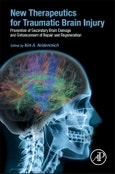New Therapeutics for Traumatic Brain Injury: Prevention of Secondary Brain Damage and Enhancement of Repair and Regeneration explores traumatic brain injury (TBI), a major cause of death and disability throughout the world. The delayed nature of the secondary injury phase suggests that there is a therapeutic window for pharmacological interventions or other approaches to prevent progressive tissue damage and improve functional outcomes. It is now apparent that therapeutic interventions should entail both protective and repair/regeneration strategies depending on the phase of brain injury.
This book describes emerging experimental strategies for the treatment of TBI, including new anti-inflammatory or anti-apoptotic therapeutics that limit brain damage, and novel or repurposed drugs that enhance repair or regeneration of the brain after injury.
Please Note: This is an On Demand product, delivery may take up to 11 working days after payment has been received.
Table of Contents
Part I. Interventional Therapies for TBI Previously or Currently in Phase 3 Clinical Trials 1. Why Did the Phase III Clinical Trials for Progesterone in TBI Fail? An Analysis of Three Potentially Critical Factors 2. Hypothermia for Traumatic Brain Injury: Current Evidence and Future Directions 3. The Future of TBI: Hyperbaric Oxygen as a Primary Therapeutic Approach
Part II. Repurposing FDA Approved Drugs for TBI Treatment 4. Erythropoietin and Its Derivatives: Mechanisms of Neuroprotection and Challenges in Clinical Translation 5. Atorvastatin in the Treatment of Traumatic Brain Injury 6. The Application of Glibenclamide in Traumatic Brain Injury 7. Perispinal Etanercept for Traumatic Brain Injury
Part III. Interventional Drugs for TBI in Phase 1-2 Clinical Trials 8. Nitric Oxide Synthase Inhibitors in Traumatic Brain Injury 9. Management of Paroxysmal Sympathetic Hyperactivity After Traumatic Brain Injury
Part IV. Interventional Drugs for TBI in Preclinical Development 10. The Use of Estrogen for the Treatment of Traumatic Brain Injury 11. Voltage-Gated Calcium Channel Blockers for the Treatment of Traumatic Brain Injury 12. 5-Lipoxygenase-Activating Protein Inhibitors: Promising Drugs for Treating Acute and Chronic Neuroinflammation Following Brain Injury 13. Carbonyl Scavenging as an Antioxidant Neuroprotective Strategy for Acute Traumatic Brain Injury 14. TrkB Receptor Agonist 7,8-Dihydroxyflavone and Its Therapeutic Potential for Traumatic Brain Injury 15. Ceftriaxone Treatment of TBI
Part V. Drugs for TBI Rehabilitation 16. Memantine: A Safe and Tolerable NMDA Antagonist with Potential Benefits in Traumatic Brain Injury 17. Interventional Drugs for TBI Rehabilitation of Cognitive Impairment: The Cholinesterase Inhibitor Rivastigmine 18. Docosahexaenoic Acid and Omega 3 Fatty Acids 19. Treatment of Mood Disorders Following Traumatic Brain Injury
Authors
Kim Heidenreich University of Colorado Denver School of Medicine, Aurora, Colorado, USA.Kim A. Heidenreich is Professor of Pharmacology and Neuroscience at the University of Colorado School of Medicine. She also serves on the Keystone Scientific Advisory Board and is Chief Scientific Advisor for the American Traumatic Brain Injury Association. Dr. Heidenreich has been conducting neuroscience research for over 30 years with continual funding in the area of neurotrophic factors, mechanisms of neuronal cell death, and recently, traumatic brain injury (TBI). Her laboratory has identified a number of protein kinase signaling pathways that trigger or prevent neuronal cell death in response to neuronal insults and neurotrophic factors, respectively. She has examined the ways in which key proapoptotic and antiapoptotic protein kinases regulate cytoplasmic, mitochondrial, and nuclear targets to control neuronal apoptosis and autophagy. Her recent studies have focused on preventing secondary brain damage after a TBI. She has recently discovered that leukotrienes, potent inflammatory lipid mediators normally absent in brain, are produced by a transcellular mechanism involving infiltrating neutrophils after TBI. Blockade of leukotriene production using 5-lipoxgenase (FLAP) inhibitors prevents edema, cell death, and cognitive deficits after TBI. These findings have important implications for treating human TBI and suggest that development of FLAP inhibitors for use in TBI is feasible for both intervention and prevention. Toward this goal, Dr. Heidenreich is currently developing FLAP inhibitors with improved CNS properties and novel delivery methods for these drugs in TBI.
As a strong advocate of Neuroscience research, Dr. Heidenreich has previously served as chair of the membership committee of the UC Denver Neuroscience Program and as President of the Rocky Mountain Neuroscience Research Group, a Colorado chapter of the Society of Neuroscience. She has mentored many pre- and post-doctoral scientists, as well as junior physician scientists, in her laboratory. She also has served as mentor for the NIH Building Research Achievement in Neuroscience (BRAiN) Training Program and was the recipient of the 2006 Dean's Mentoring Award at her institution. Dr. Heidenreich has served on numerous study sections reviewing grants for the NIH, DOD, VA and small research granting agencies. Recently, she has been invited to speak at numerous national and international TBI conferences including the Annual Traumatic Brain Injury Conference in Washington, D.C. and the C4CT Concussion Awareness Summits, the last one held Pre-superbowl 2014 at the United Nations. She has been a recipient of research support from the State of Colorado Brain Injury Program for the past five years. Dr. Heidenreich received her undergraduate degree in Biology from Westminster College in 1974 and her Ph.D. in Physiology/Biophysics from the University of Vermont in 1979.








